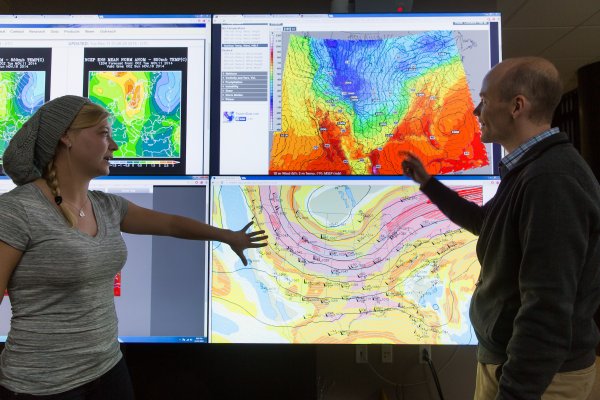Meteorology Electives
The B.S. in meteorology offers a strong foundation in atmospheric science. Advice from faculty members is invaluable in making course selections, but students can begin with these courses recommended to expand their horizons.
Elective Courses for Students Interested In …
Forecasting, instrumentation, general science, and communication are all skills vital to a broadcast meteorologist. Students interested in pursuing a career in broadcast meteorology should consider these courses and a digital media minor (communication department).
Recommended Meteorology Electives:
-
MET 240: Introduction to Climate Change or
-
MET 440: Global Climate Change
-
MET 271: Aviation Meteorology
-
MET 279: Severe Storm Prediction and Nowcasting
- MET 292: Lake Effect Snow Analysis and Forecasting
- MET 319: Tropical Meteorology
- MET 335: Meteorological Instrumentation
- MET 350: Boundary Layer Meteorology
- MET 385: Field Study in Meteorology
-
MET 435: Radar Meteorology
-
MET 486: Internship in Meteorology
A digital media minor from the communication department requires 15 credits from the digital media major and may include:
- COMM 198: Nonlinear Video Editing
- COMM 250: The Radio Industry and Audio Production
- COMM 251: Media Production
- COMM 262: Content Research and Reporting
- COMM 286: Campus Media Practicum
- COMM 380: Television Producing and Directing
- COMM 385: Advanced Media Production
- COMM 490: Topics: Weathercasting
- COMM 490: Topics: Advanced Weathercasting
Courses from the theatre department are also relevant:
- THTR 134: Voice and Diction
- THTR 357: Acting for the Camera
Up-to-date course descriptions and course prerequisites can be found in the University Catalog.
Exploring the many aspects of regional and global meteorology equips you to view a variety of meteorology problems. Forecasting tools and techniques prepare you to work in a computer technology driven field. These electives will prepare you to understand the atmosphere and the instrumentation and technology used to analyze and model the atmosphere. A geographic information systems (GIS) minor is especially useful in government and private industry careers.
Recommended Meteorology Electives:
-
MET 271: Aviation Meteorology
-
MET 279: Severe Storm Prediction and Nowcasting
- MET 292: Lake Effect Snow Analysis and Forecasting
- MET 319: Tropical Meteorology
- MET 335: Meteorological Instrumentation
- MET 350: Boundary Layer Meteorology
- MET 385: Field Study in Meteorology
- MET 430: Numerical Weather Prediction
- MET 435: Radar Meteorology
- MET 440: Global Climate Change
- MET 460: Data Analysis
- MET 486: Internship in Meteorology
-
A minor in GIS
Up-to-date course descriptions and course prerequisites can be found in the University Catalog.
Focusing on a problem, grasping the theory, analyzing data, and modeling a solution are typical steps in a solving any research problem. The following electives will provide tools, theory, and the ability to discern forecast problems as you explore research meteorology and graduate school opportunities.
Recommended Meteorology Electives:
-
MET 271: Aviation Meteorology
-
MET 319: Tropical Meteorology
- MET 330: Meteorological Computer Applications
- MET 335: Meteorological Instrumentation
- MET 350: Boundary Layer Meteorology
- MET 385: Field Study in Meteorology
- MET 430: Numerical Weather Prediction
- MET 435: Radar Meteorology
- MET 440: Global Climate Change
- MET 460: Data Analysis
Up-to-date course descriptions and course prerequisites can be found in the University Catalog.
